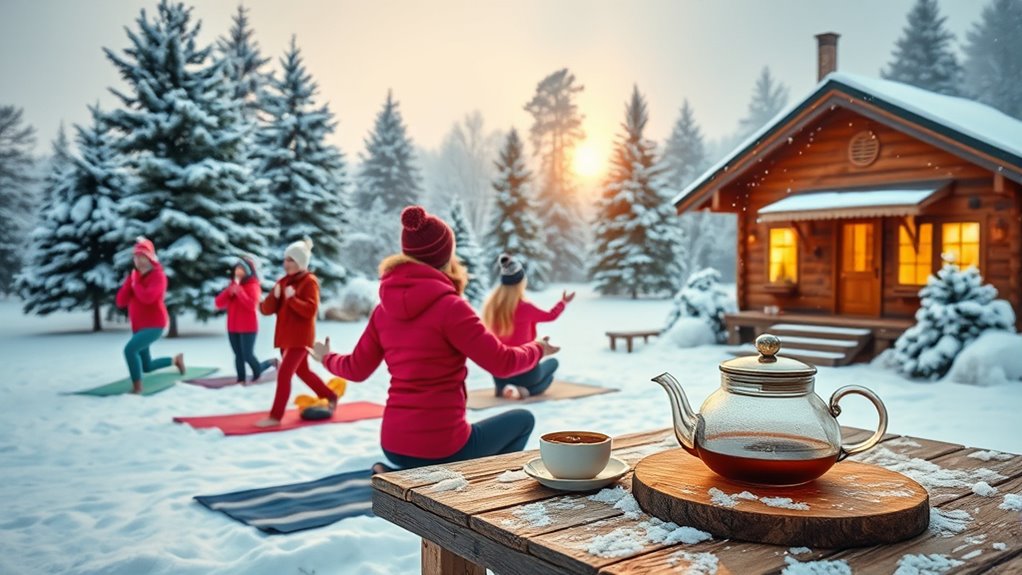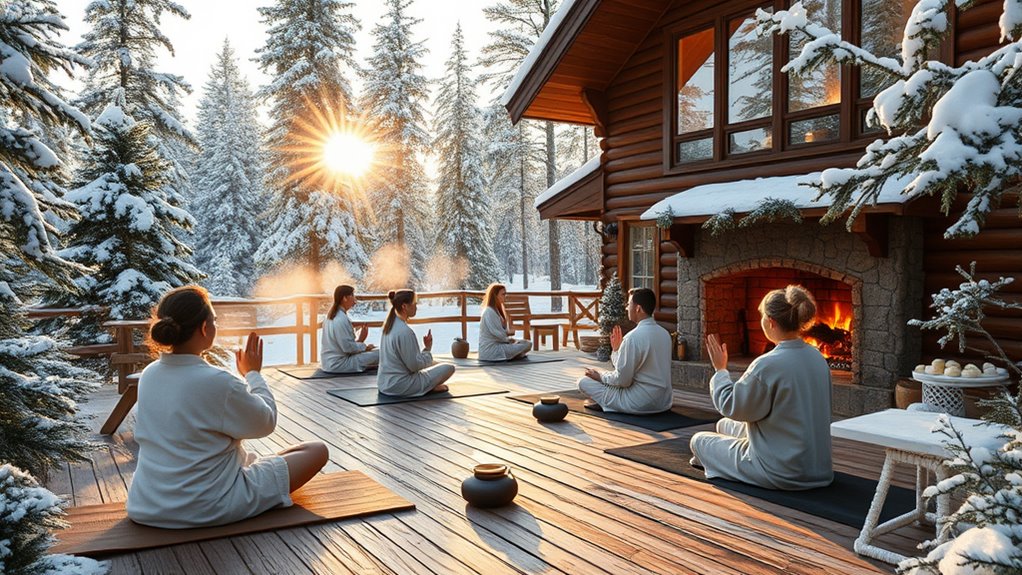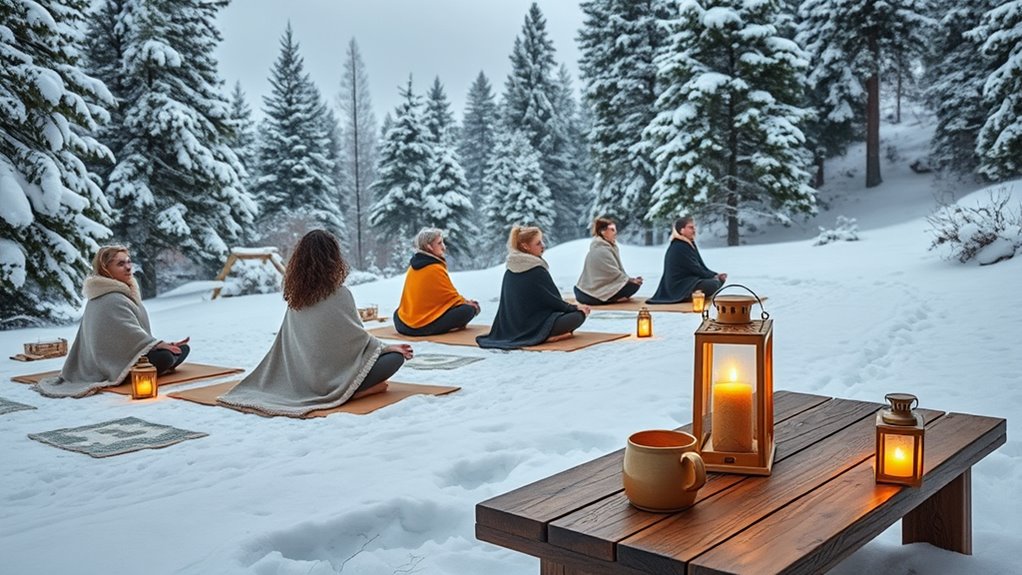An immune-boosting retreat for the cold season combines cold exposure, proper nutrition, regular exercise, and stress reduction to strengthen your body’s defenses. You’ll engage in outdoor activities with proper layering, incorporate antioxidant-rich foods and key vitamins like D and C, and practice mindfulness or relaxation techniques to lower stress. Rest is also prioritized to boost immune function. Continue exploring ways to create a holistic plan that keeps you resilient through winter’s challenges.
Key Takeaways
- Incorporate cold exposure therapies like ice baths or outdoor winter activities to activate immune pathways and enhance resilience.
- Include nutrient-rich meals with vitamins C, D, zinc, and antioxidants to support immune function during the retreat.
- Offer mindfulness, meditation, and relaxation sessions to reduce stress and regulate immune responses effectively.
- Design outdoor experiences with proper layering and safety measures to maximize cold adaptation and mental well-being.
- Emphasize rest, sleep hygiene, and stress management practices to strengthen immune defenses throughout the retreat.
Embracing Cold Exposure for Immune Enhancement

Embracing cold exposure can markedly boost your immune system by activating various immune cells and enhancing immune regulation. Cold water therapy stimulates the mobilization of circulating immune cells like leukocytes, granulocytes, and monocytes, strengthening your body’s defenses. It also boosts natural killer (NK) cell activity, vital for targeting viruses and tumor cells. Cold exposure increases cytokines such as interleukin-6 (IL-6), which help regulate immune responses. Repeated cold water immersion over time fosters higher levels of activated T lymphocytes and monocytes, promoting immune readiness. This process can lead to low-grade immune activation, offering seasonal immune support. By regularly exposing yourself to cold, you activate neural pathways involving TLR2 and γδ T cells, further enhancing your body’s ability to fight infections naturally. Research indicates that cold exposure may also influence the production of stress hormones, which can modulate immune responses and aid in immune regulation. Additionally, consistent cold exposure can improve overall immune resilience by training your immune system to respond more effectively to pathogens.
Nutritional Strategies to Fortify Your Defenses

To strengthen your immune defenses, focusing on key nutrients and foods can make a significant difference. Incorporate herbal teas and herbal remedies rich in antioxidants and anti-inflammatory compounds. Citrus fruits, berries, and leafy greens provide vitamin C, supporting white blood cell production. Fatty fish, eggs, and fortified milk supply vitamin D, essential for immune regulation. Zinc-rich foods like seafood, nuts, and beans boost antiviral defenses. Carrots, sweet potatoes, and spinach offer beta carotene to maintain mucosal barriers. Stay hydrated with water, broths, and soups, and enjoy warm herbal teas known for soothing inflammation. Nuts, seeds, and dark leafy greens deliver vitamin E and polyphenols that protect immune cells from oxidative stress. A well-balanced diet also supports overall immune health and helps prevent illness. Incorporating a variety of essential nutrients can optimize your immune response during the cold season.
Staying Active Indoors and Outdoors During Winter

Staying active during winter means balancing indoor workouts with outdoor adventures, but dressing properly is key for cold weather. You can keep moving inside with options like yoga or circuit training, while outdoor activities boost your immune system and mood. By layering appropriately, you’ll stay warm and energized, no matter where you choose to exercise. Incorporating proper clothing can make all the difference in maintaining comfort and safety during outdoor workouts.
Indoor Exercise Options
Wondering how to keep active during the winter months indoors? You can stay fit with a variety of indoor exercise options. For cardio, try activities like:
- Running on a treadmill or cycling on stationary bikes
- Rowing machines or jump rope for quick, effective workouts
- Dance classes or aerobic routines at home or the gym
- Stair climbing or high-intensity interval training (HIIT) sessions
For strength training, you can use bodyweight exercises like push-ups, squats, and lunges, or incorporate resistance bands and dumbbells. Circuit training combines strength and cardio for efficiency. Yoga and Pilates improve flexibility and core strength, making winter workouts enjoyable and effective. These options keep your immune system strong and your body energized indoors. Regular indoor exercise can also help you maintain your mental health and reduce winter blues, especially when outdoor workouts are less feasible. Incorporating AI-powered virtual reality can make indoor workouts even more engaging and personalized.
Dressing for Cold Outdoors
When heading outdoors for winter activity, dressing properly makes all the difference in staying comfortable and safe. Using effective layering techniques helps trap body heat and keeps you dry. Start with a snug base layer made from moisture-wicking materials like merino wool or synthetic fabrics to prevent sweat from chilling your skin. Layering creates microclimates between garments, which adds to your insulation and helps maintain consistent warmth. Add a midlayer, such as fleece or an insulated jacket, for warmth, adjusting based on temperature and exertion. Your outerwear selection is vital—choose a weather-resistant shell that blocks wind and moisture while allowing breathability. Pay attention to details like adjustable hoods, cuffs, and hems to tailor protection. Proper layering and the right outerwear guarantee you stay warm, dry, and comfortable during winter outdoor activities. Ensuring your clothing choices align with environmental conditions helps prevent heat loss and keeps you comfortable throughout your outdoor adventures. Don’t forget accessories like gloves, hats, and scarves.
Prioritizing Rest and Managing Stress for Better Immunity

Prioritizing quality sleep and managing stress are essential for strengthening your immune system. When you establish a consistent routine and incorporate relaxation techniques, you support your body’s natural defenses. By making these changes, you’ll help your immune response function at its best. Sleep enhances T cell activity, which plays a crucial role in fighting viruses and cancer cells, further boosting your immunity. Developing a meditative practice can also improve emotional regulation and reduce stress, contributing to overall health.
Prioritize Quality Sleep
Getting enough quality sleep is essential for a strong immune system, as it directly influences how your body responds to infections and vaccines. Prioritizing sleep hygiene helps you fall asleep faster and achieve restorative rest. To boost immunity, focus on:
- Establishing a consistent sleep schedule, even on weekends.
- Creating a calming bedtime routine to promote relaxation.
- Limiting screen time before bed to enhance sleep quality.
- Using dream analysis to identify stressors or unresolved issues affecting sleep.
Sleep fosters immune memory and antibody production, while sleep loss impairs immune cell function. Adequate sleep supports cytokine production and hormone regulation, strengthening defenses against cold season pathogens. Sleep duration and quality are regulated by homeostatic and circadian mechanisms, and disruptions to these processes can weaken immune responses. Maintaining regular sleep patterns can help synchronize these biological rhythms, thereby supporting a more resilient immune system. Prioritizing quality sleep is key to maintaining resilient immunity.
Incorporate Stress Reduction
Managing stress effectively is essential for supporting your immune system, as chronic stress can weaken your body’s defenses. Incorporating mindfulness meditation and deep breathing helps break the stress cycle, calming your nervous system and reducing cortisol levels. Practicing mindfulness 3-4 times weekly for 10-15 minutes can markedly lower inflammation and improve immune response. Deep breathing exercises, done for a few minutes daily, relax your body and lower stress hormones, boosting immunity. To emphasize this, consider the following:
| Stress Reduction Technique | Benefits |
|---|---|
| Mindfulness meditation | Lowers cortisol, calms nerves |
| Deep breathing | Promotes relaxation, immunity |
| Regular practice | Sustains immune health |
| Focused attention | Breaks stress cycle |
| Consistent daily use | Enhances overall resilience |
Prioritize these practices for a healthier immune system.
Maintain Consistent Routine
Maintaining a consistent sleep routine is essential for strengthening your immune system, as irregular sleep patterns disrupt the body’s natural defenses. Good sleep hygiene helps regulate circadian rhythms, which coordinate immune functions throughout the day. To support this, consider:
- Going to bed and waking up at the same time daily, even on weekends.
- Creating a calming pre-sleep routine to signal your body it’s time to rest.
- Avoiding screens and caffeine close to bedtime to promote quality sleep.
- Ensuring your sleep environment is cool, dark, and quiet.
- Incorporating top-rated sleep aids to improve sleep quality if necessary.
Sticking to these habits helps your body produce immune cells effectively and reduces inflammation. Consistency strengthens resilience against illnesses and improves vaccine responses, making sleep a crucial part of your immune-boosting routine.
Understanding Cold’s Impact on Your Body’s Defenses

Cold weather can weaken your body’s defenses by impairing key immune functions, making it easier for viruses to take hold. When exposed to cold, your nasal immune defenses decrease, allowing viruses like rhinoviruses to enter and replicate more easily. Cold temperatures also promote viral mutation and immune evasion, helping viruses adapt and bypass immune responses. Additionally, cold air causes blood vessels in the nasal passages to constrict, reducing immune cell circulation and cytokine signaling. This diminished immune activity hampers your body’s ability to detect and respond effectively to infections. As a result, the risk of developing cold symptoms increases, and the severity of illness can worsen. Understanding how cold impacts your immune defenses underscores the importance of protective measures during chilly seasons. Knowing how cold affects immune function is essential for developing effective strategies to stay healthy.
Supplementing Wisely to Support Seasonal Immunity

Supplements can help support your immune system during seasonal changes, but their effectiveness depends on proper use. To maximize benefits, focus on supplement timing and nutrient synergy. Here are four tips:
- Take vitamin C daily, between 250 mg and 2,000 mg, especially during cold season, to potentially reduce cold risk and duration.
- Start zinc within 24 hours of cold symptoms to shorten illness.
- Prioritize correcting deficiencies by evaluating your baseline nutrient levels before supplementing.
- Combine nutrients, like vitamin D and zinc, to support immune responses effectively. Ensuring adequate nutrient levels can optimize immune function and overall health.
Mind-Body Practices to Boost Resilience Against Illness

Engaging in mind-body practices offers a powerful way to strengthen your immune resilience. Mindfulness meditation and cognitive behavioral techniques help lower cortisol and inflammatory cytokines like IL-6 and TNF-α, reducing systemic inflammation. Combining these practices yields synergistic effects, further improving immune function by lowering stress biomarkers. CBT enhances natural killer (NK) cell activity, vital for fighting viral infections, especially in chronic illness populations. Mindfulness meditation promotes immune regulation by decreasing stress-induced immunosuppression. Relaxation training, including progressive muscle relaxation, boosts immune markers such as salivary IgA and increases immune cell counts like NK cells and CD4+ T lymphocytes. Additionally, regular practice of these techniques can foster a positive mindset, which has been shown to support overall health and resilience. Together, these mind-body practices normalize immune responses, reduce inflammation, and help your body better resist illnesses during the colder months.
Designing a Wellness Retreat for Cold Season Vitality

Creating a wellness retreat focused on cold season health involves selecting a location that immerses guests in winter landscapes and leverages natural elements known for supporting immunity. Picture a serene setting with:
- A breathtaking winter landscape, perfect for outdoor walks and mood enhancement.
- Proximity to thermal springs, harnessing natural warmth and immune-boosting minerals.
- Indoor/outdoor spaces designed to manage the cold while allowing nature exposure.
- Reliable, comfortable lodging that promotes restful recovery after daily activities.
- Consider incorporating cost and budgeting strategies to ensure the retreat remains financially sustainable and accessible for guests.
Choose a site with access to fresh, organic seasonal foods to support immune function. Incorporate scenic winter views and thermal springs into your program to enhance relaxation and vitality. This thoughtful setting creates an environment that nurtures resilience and well-being during the cold months.
Frequently Asked Questions
How Does Cold Exposure Specifically Influence Immune Cell Activity?
Cold shock specifically influences your immune cell activity by increasing circulating NK cells and granulocytes, boosting innate immunity. It activates immune modulation through catecholamine release, which affects lymphocyte distribution and function. Short-term cold exposure may temporarily suppress some adaptive responses, but with repeated cold shock, your immune system adapts, restoring lymphocyte activity. Elevated cytokines like IL-6 also enhance immune activation, making cold exposure a complex but beneficial immune modulator.
What Are the Best Dietary Sources of Immune-Boosting Nutrients in Winter?
Many believe certain foods boost immunity, and evidence supports this. You should focus on vitamin C-rich foods like citrus fruits, bell peppers, and leafy greens to enhance your immune response. Zinc sources such as nuts, seeds, and mushrooms also play a vital role in fighting infections. Incorporating these into your winter diet helps strengthen your immune system naturally, keeping you healthier through the cold season.
Can Outdoor Exercise During Cold Weather Enhance Immunity Safely?
You can safely enhance your immunity by exercising outdoors in cold weather, as it boosts immune cells and improves circulation. Unlike indoor workouts, outdoor activity exposes you to natural light, increasing vitamin D levels, which supports immune regulation. Just make sure to dress appropriately to stay warm and prevent cold stress. Combining cold exposure with exercise strengthens your defenses without the risks associated with prolonged extreme cold or indoor crowding.
How Does Stress Reduction Improve Immune Response in Winter Months?
Stress reduction improves your immune response in winter by lowering stress hormones like cortisol, which suppress immunity. Mindfulness practices help you relax and decrease these hormones, boosting T-cell proliferation and antibody production. Strengthening social connections also reduces psychological stress, further enhancing immune function. Together, these strategies support your body’s ability to fight infections during cold months, making you more resilient against winter illnesses.
When Should I Consider Supplementation for Winter Immune Support?
You should consider nutritional timing for winter immune support before peak cold and flu season, especially if sunlight exposure decreases or your diet lacks essential nutrients. Prioritize high-quality supplements like vitamin D, C, zinc, and probiotics to boost your defenses. Starting early guarantees your immune system is prepared; always choose supplement quality to maximize benefits and avoid unnecessary risks. Consult a healthcare provider for personalized guidance tailored to your needs.
Conclusion
So, this cold season, why not turn into a fortress of health? Embrace the chill, fuel your body right, stay active, and relax your mind—because who doesn’t want to be the immune superhero hiding behind that winter sweater? Skip the sniffles and gloom; instead, make your wellness retreat your secret weapon. After all, if you can’t beat the cold, you might as well look fabulous trying. Stay resilient—and maybe keep the tissues nearby, just in case.









